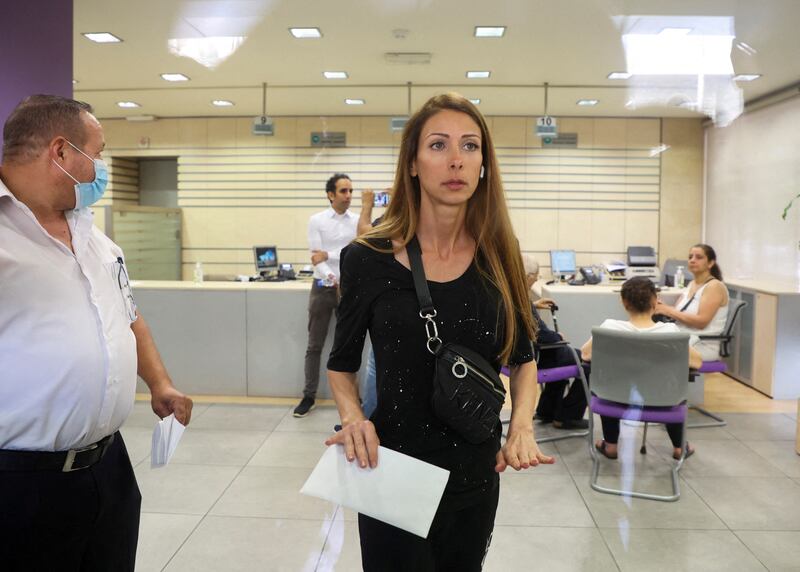A Lebanese MP on Wednesday stormed a Byblos bank branch near Beirut, peacefully demanding the release of her frozen savings to cover medical expenses. It was the latest episode in a series of incidents in recent months in which depositors — sometimes armed — have forcibly withdrawn their own money, trapped in Lebanon's commercial banks.
MP Cynthia Zarazir is the first member of Parliament to publicly join a string of depositors who have appropriated their savings amid mounting anger over the informal capital controls that banks have imposed since 2019.
After hours of negotiation, she was able to leave the bank with $8,500 fresh US dollars.
The withdrawal was made to help pay for an operation that Ms Zarazir's health insurance does not fully cover, according to her lawyer Fouad Debs.
Mr Debs, the co-founder of the Depositors' Union — an association which seeks to defend depositors' rights — accompanied Ms Zarazir at the bank to negotiate the release of her savings.
The legislator suffers from a chronic condition, he explained, but declined to go into detail, citing Ms Zarazir's right to privacy.
“She had been asking for her money for the last two days,” he told The National. “And the bank didn't answer us. So, we decided to go and demand it.”
Unlike some customers who have demanded their own money, she was not armed.
The branch was immediately shut after she entered.
Ms Zarazir was initially offered her savings at the rate of LL8,000 to the dollar — or about 20 per cent of its worth in dollars, according to Mr Debs, but she rejected the offer.
The bank’s offer is lower than the official rate of LL15,000 to the dollar which is set to take effect from November 1.
Mr Debs called the offer “ridiculous”.
“Today she's not here demanding her money as an MP, she's here as a normal depositor demanding her right to her own money,” he said.
At midday, a wan-looking Ms Zarazir approached the bank's glass facade to signal to her colleagues outside that she was feeling ill. They passed medication and food to her through a side door.
MP Halime Kaakour arrived at the bank to express support for her colleague.
“Cynthia is here as a normal depositor, just like other depositors who are also facing this oppressive injustice," Ms Kaakour told the press.
Both MPs are members of a coalition of legislators who represent an opposition to Lebanon's entrenched political elite.
"She needs surgery. Meanwhile as MPs we are fighting in the parliament to enact laws for economic reform, but others in the parliament keep drafting ridiculous laws like the current draft capital control law — which is a joke — and then delaying and delaying and delaying signing off on any reforms," Ms Kaakour said.
“This entry into the negotiations is the result of the absence of any real economic reforms. She’s unarmed, she’s negotiating, she’s demanding her right.”
Protests blocking the road
Cases of bank hold-ups have increased across Lebanon as residents have grown frustrated with controls.
Depositors can withdraw only limited amounts in US dollars or the Lebanese pound, which has lost more than 95 per cent of its value since the financial crisis began.
Separately, depositors protested against capital controls and the wider financial crisis outside the headquarters of Banque Du Liban in Beirut and blocked the road.
They set fire to tires at the gates, threw glass bottles at the BDL building and briefly clashed with security forces. The demonstrators also voiced their anger against the much-derided BDL governor Riad Salameh, who has come under intense criticism for his role in Lebanon's economic collapse.
Rami Ollaik, whose organisation Mouttahidoun assists depositors including those involved in entering the banks, described it as a day of “rage” and “escalation”.
Some held signs saying “France, US, do not support [Prime Minister Najib] Mikati”.
“This is meant to [take] things to a higher level. These bank raids are fine, but in the end we are certain the banks are buying time despite these scattered raids here and there,” Mr Ollaik said.
“This is not going to stay the only mode of action because they are planning to go forward with the capital control bill … we need to take [our actions] further.”
Lebanon’s former ambassador to the UAE was among a group of angry depositors who entered at least four banks across Lebanon on Tuesday, demanding access to their frozen savings.
It followed a similar incident on Monday.
Lebanon's banking association has expressed outrage over the hold-ups. A similar surge last month prompted banks to close for about a week.
The public have commended the angry depositors, with some hailing them as heroes.
In September, Sally Hafez went into a Beirut bank branch with a fake pistol and canister of petrol to withdraw $13,000 to pay for her sister’s cancer treatment.






